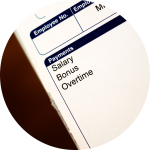The California Supreme Court ruled that missed break payments are wages. (Naranjo versus Spectrum Security Services, Inc.) In this recent case, the California Supreme Court ruled that the extra pay an employer must pay an employee (should the employee work during their meal break) constitutes wages for purposes of California’s final pay and itemized wage statement requirements.
Employers must report these payments on wage statements. Payments must also be paid in a timely manner to employees.
The failure to do so can lead to significant penalties.
Meal Periods
Under California law, nonexempt workers are entitled to a 10-minute paid rest break for every four hours worked “or major fraction thereof.” Employees must also receive a 30-minute unpaid meal break for every five hours worked. Employees can waive their right to take a meal break only if they work no more than six hours. A second break must be provided after 10 hours, but can be waived by the employee if the first break was taken and the employee works no more than 12 hours.
Click here for more information from the State of California Department of Industrial Relations.
Waiting Time Penalty
California law also provides for a penalty when there is a willful failure to pay wages due to the employee at conclusion of the employment relationship. The penalty is measured at the employee’s daily rate of pay and is calculated by multiplying the daily wage by the number of days that the employee was not paid, up to a maximum of 30 days. The 30-day period is calendar days and includes weekends and holidays and any other days that the employee would not normally work.
Click here for more information from the State of California Department of Industrial Relations.
California law requires employers to provide accurate employee wage statements, including (among other requirements) hourly rates in effect, hours worked, gross wages and net wages earned. The failure to do so can lead to penalties, including but not limited to, a penalty in the amount of $50 for the initial pay period violation and $100 for every subsequent violation with a $4,000 aggregate cap per employee.
California Supreme Court Decision
The California Supreme Court concluded that the extra pay for missed meal and break periods is considered wages. The court explained that while the extra pay is designed to compensate for the unlawful deprivation of a guaranteed break, it also compensates for the work the employee performed during the break period. The pay is considered wages subject to the same wage statement and final pay requirements as other forms of compensation for work. Payments for missed meal and rest breaks must be reported on the employee’s wage statements and must be timely paid to avoid substantial penalties for noncompliance.
The case is a reminder about the importance of compliance with California’s meal and rest break requirements. California employers should adhere to these requirements, ensure that employee payments are made for missed meal and break times, are reported on wage statements, and are paid timely.
*Southland Data Processing, Inc. (“SDP”) is not a law firm. This article is intended for informational purposes only and should not be relied upon in reaching a conclusion in a particular area of law. Applicability of the legal principles discussed may differ substantially in individual situations. Receipt of this or any other SDP materials does not create an attorney-client relationship. SDP is not responsible for any inadvertent errors that may occur in the publishing process.

